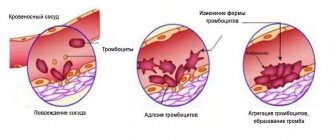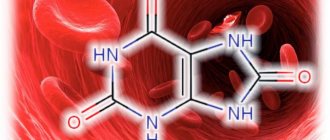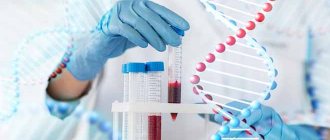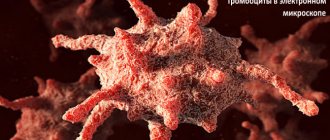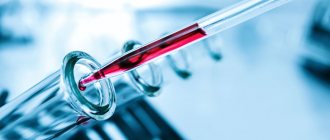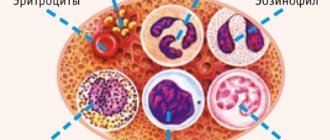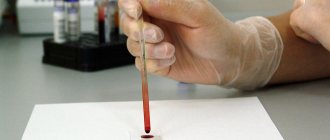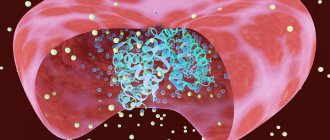High blood cholesterol levels increase the risk of developing coronary heart disease. But too low cholesterol can also indicate health problems. Hypocholesterolemia is a rare and not yet well studied disease. Is it good or bad to have low blood cholesterol? To answer this question, you need to understand what causes this condition and the nuances of this pathology.
The importance of cholesterol in the body
Cholesterol (cholesterol) is a compound that is a lipid.
There are 2 types of this substance in the human body:
- Good (HDL). It is considered an organic compound produced by the liver to maintain vital functions.
- Bad (LDL). The connection has low density. It comes from some human-consumed foods. Such lipoproteins are considered dangerous substances that can lead to deterioration of health, especially if contained in the body in large quantities.
Functions of cholesterol:
- It is an important component of many hormones produced by the body.
- Participates in the synthesis of salts found in bile acid and necessary for digestion. In addition, the connection provokes the beginning of this process.
- Helps maintain the integrity of the walls of all parts of the intestine.
- Promotes the process of serotonin production.
- Strengthens cell membranes due to the fact that it is their constituent element.
- Helps absorb certain minerals.
- Supports muscle tone, adrenal function, and the conversion of sun energy into vitamin D.
- Reduces the risk of developing malignant neoplasms, vascular diseases, and also prevents the occurrence of stressful situations.
The amount of cholesterol produced is of great importance for a growing body. Its ability to maintain cell integrity is indispensable during the period of most active growth, especially at the time of cell division.
Possible causes of decreased cholesterol levels
Fatty alcohol or cholesterol is another name for the well-known cholesterol. The mechanism for reducing its concentration in the body has been poorly studied, but based on the available data, the following conclusions can be drawn. Experts call the probable causes of the pathology:
- Severe liver diseases. It is this organ that synthesizes up to 80% of the total amount of cholesterol, so liver diseases lead to a drop in its level.
- Irrational diet. We are talking about ignoring foods containing fats and preferring foods with fast carbohydrates.
- Vitamin deficiencies. Deficiency of substances necessary for the body due to starvation, severe infectious diseases, anorexia.
- Prolonged state of stress. Adrenaline, produced during nervous overload, is an antagonist of fatty alcohols.
- Pathologies of the thyroid gland. For example, hyperthyroidism is accompanied by severe disruption of the production and balance of essential hormones. Changes in hormonal levels are another reason for the decrease in its concentration in the blood.
- Taking drugs that suppress the synthesis of fatty alcohols. Inadequate dosage of statins, fibrates, and nicotinic acid can lead to an excessive reduction.
In addition, prolonged febrile states caused by infectious diseases (tuberculosis, pneumonia) or injuries are recognized as provoking hypocholesterolemia. Unfavorable factors of occurrence also include anemia or hereditary abnormalities, often associated with liver dysfunction.
In women, changes in blood cholesterol concentrations often occur during pregnancy. Especially if it is complicated by a relapse of chronic diseases.
Normal values in children, men and women
Cholesterol levels are determined by performing laboratory blood tests. Detection of a high or, conversely, low level should be a signal to visit a doctor and undergo additional examinations in order to eliminate the cause of the pathological change. A deviation is considered to be a discrepancy between the obtained result and the norms established for the indicator according to age categories.
Table of norms for women depending on age:
| Age, number of years | Value, mol/l |
| 20 | 3,11-5,17 |
| 30 | 3,32-5,8 |
| 40 | 3,9-6,9 |
| 50 | 4,0-7,3 |
| 60 | 4,4-7,7 |
| Over 70 | 4,48-7,82 |
For men, slightly different standards are established.
This is due to the fact that the acceptable values for women are high for the opposite sex, since in such situations men are at greater risk of developing cardiac or vascular pathologies. Table of norms for men depending on age:
| Age, number of years | Value, mol/l |
| 20 | 2,93-5,1 |
| 30 | 3,44-6,31 |
| 40 | 3,78-7 |
| 50 | 4,1-7,15 |
| 60 | 4,04-7,14 |
| Over 70 | 4,0-7,0 |
Values from 2.9 to 1.6 mmol/l are considered low and require determination of the cause. A reduced level is recognized when values from 2.9 to 1.8 mmol/l are detected in women. These conditions are considered dangerous and therefore require appropriate therapeutic measures.
It should be noted that each laboratory has its own standards for indicators, so you should focus on the results of the medical center that performed the analysis.
What does this mean for men?
A TC (total cholesterol) value of less than 3 mmol/liter is considered a low level for men. In addition to the pathologies described above, this can lead to the following negative consequences:
- Adolescents experience irreversible consequences of the development of the genitourinary system.
- In adults, a deficiency of sex hormones and sexual impotence are detected.
- In older people, the risk of cardiovascular accidents – heart attack, stroke – increases many times.
- Elderly people are at risk of developing dementia.
Experts say the most common reasons for decreased cholesterol levels in men are: long-term infectious diseases, poor diet, and stress.
Possible reasons for the decrease
Cholesterol deficiency can provoke the occurrence of many diseases, so it is important to know why its level has decreased in order to take appropriate measures.
The indicator is influenced by various pathological changes occurring in the body, or by external factors.
A drop in the level of the compound in the blood indicates liver dysfunction or an unbalanced diet.
Main reasons:
- pathologies of the digestive system;
- predisposition at the genetic level;
- stress instability;
- poisoning by poisons, chemicals;
- inflammatory processes;
- dysfunction of the thyroid gland;
- bad habits;
- abuse of foods containing small amounts of fat and enriched with sugar;
- hyperthyroidism;
- infections.
Provoking factors:
- Pregnancy, which not only contributes to hormonal changes, but also leads to a decrease in the values of many indicators. Lack of cholesterol can be felt for another 2 years after the birth of the child.
- Menopause. This condition is accompanied by a lack of production of estrogens that regulate cholesterol synthesis.
- Taking contraceptives. Such medications contain a progestin component, which in some cases reduces the value of the indicator.
- Obesity. This condition is characterized by a decrease in the amount of low-density lipoproteins (LDL) and their loss of atherogenic functions.
- Taking statins, interferon, and other drugs that cause a drop in high-density cholesterol (HDL) cholesterol.
The following diseases lead to a decrease in LDL:
- obstructive pulmonary disease, occurring in a chronic form;
- severe liver damage;
- inflammatory processes occurring in the liver;
- exacerbation of diseases, infections;
- oncology.
Video material about the functions of cholesterol in the human body:
Changes in the blood level of total cholesterol are not accompanied by any manifestations, so diagnosing this condition requires laboratory tests. Symptoms can only be present against the background of already developed diseases that cause the indicator to deviate from the norm.
Features of blood lipoproteins
Cholesterol is a fatty alcohol that is present in the blood of people of all ages. The synthesis of 1 gram of cholesterol is carried out per day. About 50% of the substance is formed in the liver, 15-20% in the small intestine, the remainder in the skin, adrenal cortex, and gonads. About 300-500 mg of cholesterol comes from food. Cholesterol and its esters, due to their hydrophobicity, can be transported throughout the body only in the form of lipoproteins. About 300 different proteins are involved in cholesterol metabolism. At the same time, the synthesis of cholesterol requires at least 100 reactions performed in turn.
Total cholesterol is the combined value of lipoproteins of different densities.
A negative effect on the body is caused by a change in the balance towards bad (low density) lipoprotein. With age, the norms corresponding to early indicators begin to increase. Pathologies of the body are noted when the limit changes below or above the corresponding values.
Normal blood lipoprotein levels in women are:
- Total cholesterol: 3.0-5.5 mmol/l.
- LDL (low density lipoprotein): 1.95-4.5 mmol/l.
- HDL (high density lipoprotein): 0.85-2.28 mmol/l.
- TG: 0.5-2.6 mmol/l.
Why is a lack of lipoproteins dangerous?
A low level of the indicator leads to consequences no less dangerous than a high one.
Main negative changes in the body:
- the structure in soft tissues and organs is disrupted;
- cell membranes become weakened;
- the synthesis of sex hormones in men stops, which leads to deviations in reproductive function;
- the likelihood of stroke, asthma, depression leading to suicide increases;
- the risk of liver cancer increases;
- a person can become addicted to alcohol and drugs;
- cerebral circulation is impaired;
- the intestinal walls become permeable to various harmful substances, as a result of which toxins penetrate into the blood and do not exit with feces;
- osteoporosis may occur;
- The risk of type 2 diabetes increases due to the development of insulin instability caused by cholesterol deficiency.
Thus, a decrease in the indicator poses a threat not only to the physical state, but also to the psychological one.
Patient symptoms and possible complications
Low cholesterol in the blood cannot be seen externally. Changes can only be detected by conducting a biochemical study. However, if a medical examination has not been carried out for a long time, and the patient has not previously been diagnosed with any somatic disease, then a number of indirect signs can suggest a change in the blood lipoprotein content.
Symptoms:
- Decreased appetite or lack thereof.
Hypocholestrinemia may manifest as decreased appetite
- Steatorrhea: stool containing fat.
- Muscle asthenia, general decrease in tactile sensitivity, motor reflexes
- Depressed (even to the point of depression) or aggressive state.
- Enlarged lymph nodes.
Women, just like men, experience a decrease in sexual desire. Low levels of blood lipoproteins can lead to the development of serious complications in the body. Given that cholesterol has a scaffolding function in the vascular wall, there is a high probability of developing hemorrhagic stroke. This occurs against the background of a decrease in the elasticity of blood vessels, in which, under the load of blood flow, ruptures occur, with the release of bloody contents into the soft tissues.
The depressed state is caused by insufficient functioning of serotonin, the hormone of joy. Its functional activity depends on the level of blood cholesterol. An insufficient level can lead to the development of depression, with suicidal tendencies. In old age, the development of dementia and Alzheimer's disease is possible.
Vitamin D is synthesized with the participation of complex lipoproteins and therefore a lack of this link can lead to the development of osteoprosis. Fat-soluble vitamins are not absorbed without the participation of cholesterol. If there is an imbalance in lipid metabolism, difficulties arise in the process of processing fats. All this leads to the development of obesity.
Osteoporosis is characterized by increased bone fragility
Cholesterol is a structural element of sex hormones. Its deficiency can immediately affect erectile function.
In women, low blood lipoprotein levels can cause infertility.
Treatment options for the condition
How to increase cholesterol? Initially, a thorough examination is carried out, the performance of the heart, blood vessels and respiratory system is assessed. After passing the tests, the patient can be referred for examination to more specialized specialists - an endocrinologist or gastroenterologist, depending on the prevailing pathology. After receiving all the data, the doctor will determine the cause of the decrease in blood lipid levels. Only after this will therapy be prescribed.
Hypocholesterolemia is treated individually for each person. This means that there are no special drugs to increase blood cholesterol. Treatment is aimed at eliminating the cause of this condition and eliminating symptoms. You can raise lipid levels with a special diet. It includes foods that are high in fat and low in carbohydrates. Recommended:
- hard cheeses;
- pork meat and fatty beef;
- liver, brains;
- eggs (preferably just yolks);
- sea fish and seafood;
- flax seed, walnut kernels;
- vegetable and animal fats.
Don't forget about plant foods. It is advisable to eat a lot of vegetables, fruits and greens. Experts advise preparing porridge from grains rich in fiber - oatmeal, millet, rice. For drinks, you should give preference to green tea and freshly squeezed juices. It is recommended to consume the products baked, boiled or stewed. It is advisable to use vegetables and fruits raw. Alcohol, coffee and sweets should be avoided.
Consequences of low cholesterol
So, it has been proven that low cholesterol is significantly harmful to health. Cancer, dementia, depression, the inability to conceive a child - all these are terrible consequences of a low-calorie diet without animal fats and taking anti-cholesterol drugs. Here is the data provided by a physician from San Francisco who observed 350,000 young Americans for a long time: when cholesterol decreased to 4.6 mmol/liter in people over 20 years of age, the risk increased:
- stroke with rupture of cerebral vessels - by 200%;
- bronchial asthma and emphysema – by 200%;
- malignant tumors in the liver – by 300%;
- clinical depression and suicide – by 200%;
- alcohol addiction and drug addiction – by 500%.
And all this is only because people are taught from childhood that fat is bad and you shouldn’t eat it. And if you suddenly have problems with your heart or blood pressure, then again fat is to blame and you need to immediately start fighting it by any means and means.
Preventive measures
It is much easier to prevent the onset of a disease than to treat it. To normalize blood cholesterol levels, as well as to prevent hypocholesterolemia, you will need to eat rationally, adhere to a healthy lifestyle, exercise and get rid of bad habits forever.
Each of us hears fairly simple rules every day, but, unfortunately, rarely does anyone follow them. By refusing to follow reasonable recommendations, you can speed up the time when the result of the analysis will notify you of an unpleasant diagnosis, which will not be easy to cope with. That is why it is better to think about health now and try to adhere to a healthy lifestyle.
Symptoms
It is impossible to determine hypocholesterolemia by external manifestations. To determine cholesterol levels, the patient must take a biochemical blood test performed on an empty stomach. In cases where you cannot visit the hospital for some reason, you should pay attention to your own well-being.
Symptoms such as lack of appetite for a long time, decreased sensitivity, systematic weakness, fatigue, and the presence of fatty loose stools can signal low cholesterol.
Enlarged lymph nodes, rapid mood swings, and decreased sexual activity appear. The listed symptoms may indicate hypocholesterolemia, so it is important to urgently consult a doctor and get tested!
How to prepare and take the test?
The day before the study, it is prohibited to drink alcoholic beverages or visit the sauna.
Laboratory testing is carried out by drawing blood from a vein. Next, it is studied under a microscope, identifying the amount of total, good and bad cholesterol. The analysis is performed in the morning on an empty stomach. Doctors advise not to eat 12 hours before the procedure. You can only drink water or tea.
The day before the study, it is prohibited to go to sports training, drink alcoholic beverages, or visit the sauna or bathhouse. One hour before the procedure you should not smoke. And immediately before taking blood, it is recommended to sit for at least 10-15 minutes so that the heartbeat normalizes.
If the patient is taking any medications, you should immediately tell the doctor about it.
How dangerous is low cholesterol - scientists' opinion
In Europe, patients were observed with total cholesterol levels below 3.9 mmol/liter. As a result, out of two, three died a premature death. While the observed patients with high cholesterol successfully underwent treatment and continued to live.
British researchers found out and published their findings in a popular scientific journal: those people who commit suicide, in most cases, had low cholesterol levels. Another interesting study was conducted by doctors from Iceland. They observed men over eighty years of age and found that those who had cholesterol levels above 6.5 mmol/liter were sick less and died 2.5 times less often than those whose cholesterol concentration did not exceed 5.2 mmol. /liter.
Doctors from Leiden University agreed with them. They also found that increasing fatty alcohols in the blood by about 1 mmol/ditre could reduce the mortality rate by 15%. Shocking data, considering that most people are accustomed to considering cholesterol as enemy number one, the culprit of all ailments and health problems, and therefore they try in every possible way to reduce it as much as possible and not eat it.
Scientists around the world have already made similar conclusions, having been monitoring patients over 45 years of age for decades, monitoring their pathologies and mortality rates against the background of changes in cholesterol in one direction or another. No direct link has been established between early mortality and high fat intake. While cholesterol deficiency had an extremely negative impact on the condition of the entire body, primarily on the functioning of the brain and nervous system.
